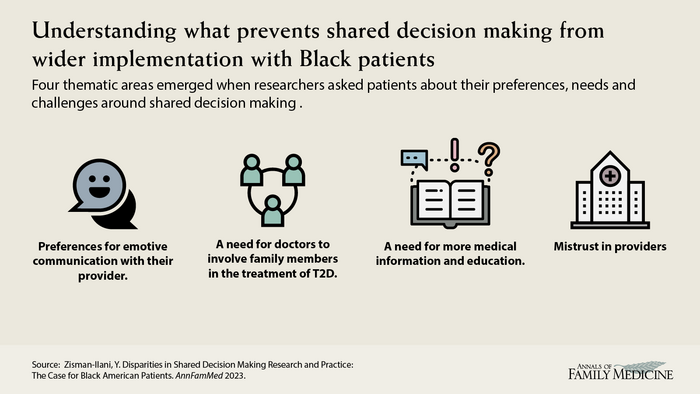Understanding What Prevents Shared Decision Making From Wider Implementation With Black Patients

Credit: Annals of Family Medicine
Understanding What Prevents Shared Decision Making From Wider Implementation With Black Patients
To understand the perspectives of Black patients on shared decision making (SDM) during medical appointments, researchers and clinicians investigated the preferences, needs and challenges around SDM as experienced by Black individuals. The team also offers possible adaptations and modifications for SDM models, practice and research within Black communities. The study team recruited 32 Black patients – 18 men and 17 women – with type 2 diabetes from safety-net primary care clinics caring for medically underserved racial and ethnic communities. The team conducted qualitative interviews, asking about unmet needs, challenges and what might help in facilitating SDM. The team asked about issues related to race, culture and disparities. At the end of the interviews, participants completed the 9-item Shared Decision Making Questionnaire (SDM-Q-9).
Four themes emerged from the interviews: The first was preferences for humanistic communication. Participants reported a desire for their doctors to express empathy, concern and compassion as part of the medical appointment. They also wanted communications that utilized first names between doctors and patients and wanted “ice breaker” communications including humor and conversations with them rather than talking at them. The second theme that emerged was the need for doctors to account for the central role of family members in decision-making to facilitate adherence and engagement with the prescribed treatment. The third was the need for more medical information, specifically about tests and treatments; and the fourth theme was a growing mistrust in doctors, especially when patients felt unseen to the doctor or staff. Zisman-Ilani et al also suggested actions to help doctors better communicate with patients. The team argue that their findings offer meaningful and necessary insights and recommendations for future use and adaptations to make SDM more valuable in the care of Black patients and other ethnoracial minorities.
What is Known on This Topic: Shared Decision Making (SDM) has been studied for several decades, but its implementation and use with Black and other ethnic and racial minority patients is limited.
What This Study Adds: Accommodations for SDM practice with Black patients in safety-net primary care settings are needed to make SDM more relevant and socioculturally sensitive to the experiences, needs and preferences of diverse groups of patients.
Disparities in Shared Decision-Making Research and Practice: The Case for Black American Patients
Yaara Zisman-Ilani, MA, PhD, et al
Department of Social and Behavioral Sciences, College of Public Health, Temple University, Philadelphia, Pennsylvania and Department of Clinical, Educational and Health Psychology, Division of Psychology and Language Sciences, University College London, London, United Kingdom
Permanent link
Journal
The Annals of Family Medicine




